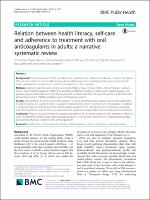Please use this identifier to cite or link to this item:
https://repositorio.usj.es/handle/123456789/286
| Title: | Relation between health literacy, self-care and adherence to treatment with oral anticoagulants in adults: a narrative systematic review |
| Authors: | Cabellos García, Ana Cristina

Martínez-Sabater, A. 

Castro-Sánchez, E. 

Kangasniemi, M. 
Juárez-Vela, Raúl 


Gea-Caballero, Vicente Antonio 
|
| Keywords: | Health literacy; Oral coagulation therapy; Self-management; Self-care; Adherence; Systematic review |
| Issue Date: | 4-Oct-2018 |
| Publisher: | BMC, CAMPUS, 4 CRINAN ST, LONDON N1 9XW, ENGLAND |
| Citation: | Cabellos-García, A.C., Martínez-Sabater, A., Castro-Sánchez, E. et al. Relation between health literacy, self-care and adherence to treatment with oral anticoagulants in adults: a narrative systematic review. BMC Public Health 18, 1157 (2018) doi:10.1186/s12889-018-6070-9 |
| Abstract: | Background Oral anticoagulants (OAC) are widely used in patients with cardiovascular diseases. However, for optimal OAC self-care patients must have skills, among which health literacy (HL) is highlighted. We aimed to describe the relation between HL and self-care in cardiovascular patients on OAC treatment. Methods Electronic searches were carried out in the PubMed, Scopus, Embase, CINAHL, Web of Science, Cochrane Library, SciELO, IME-Biomedicina, CUIDEN Plus and LILACS databases, limited to Spanish and English language and between January 2000–December 2016. Papers reported on adults older than 18 years, taking OAC by themselves for at least three months. PRISMA guidelines were used for paper selection. Results We identified 142 articles and finally included 10; almost all of them about warfarin. Our results suggest that in patients taking OAC treatments there is a positive relationship between HL and the level of knowledge. In addition, a small percentage of participants on the selected papers recognized the side effects and complications associated with OAC treatment. Lower HL level was associated with greater knowledge deficits and less adherence to treatment. Conclusion There is a paucity of research evaluating the effect of HL on diverse aspects of OAC treatments. There is a need to expand the evidence base regarding appropriate HL screening tools, determinants of adequate knowledge and optimal behaviours related to OAC self-management. |
| URI: | https://repositorio.usj.es/handle/123456789/286 |
| ISSN: | 1471-2458 |
| Appears in Collections: | Artículos de revistas |
Files in This Item:
| File | Description | Size | Format | |
|---|---|---|---|---|
| s12889-018-6070-9.pdf | 1,47 MB | Adobe PDF |  View/Open |
This item is licensed under a Creative Commons License

